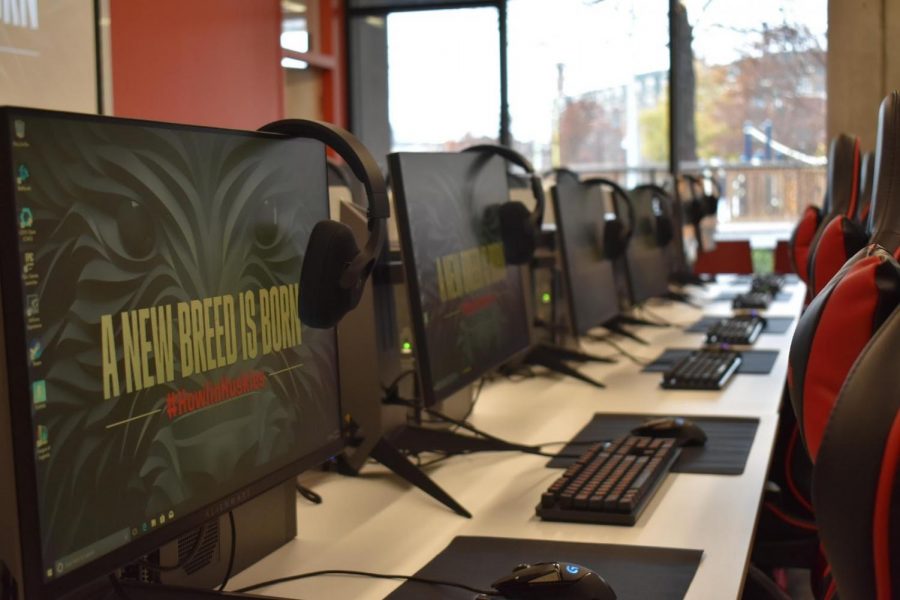Northeastern elevates esports to the varsity level
Photo courtesy Northeastern Athletics.
Northeastern already has robust esports facilities thanks to their multiple club teams.
May 1, 2020
Last month, Northeastern University became the first Division I institution in the New England area to elevate its esports program to the varsity level.
Four teams will begin competing in four different games at the D1 level, those being Overwatch, Rocket League, League of Legends and Hearthstone.
“Being the first New England institution to offer varsity, I think it’s just such a feather in the cap,” said Northeastern Athletic Director Jeff Konya. “And just the fact that we got so many people interested from the student body in this, I do think it’s the wave of the future.”
The initiative to bring esports to the varsity level has been in the works for over two years, but the school is not yet ready to begin competing. The school is still deciding the structure of the teams and how they will be built.
“We’re still working out a lot of the absolute specifics of exact roster sizes and things like that, but overall, it’s going to be exactly the same as a varsity structure,” said Nick Avery, the associate director of club sports and esports. “We’re going to be competing in all of the premier championships that these games have to offer.”
As for team building, Konya believes recruiting may not start right away.
“My gut tells me it likely will be a tryout competition, an open form, for those who have interest in playing under the esports varsity banner, and then from there, once we have the teams populated, there might be more recruiting or specialized recruiting into the future.”
These tryouts could involve many athletes who have been involved in the Northeastern club or intramural esports in the past, or brand-new athletes coming out of the shadows.
“The great thing is we [have] an unbelievable foundation that the club sports program has already started for us,” Avery said. He hopes the foundation built by club sports will make the transition to varsity easier.
Konya also stated that the operating budget still needs to be determined, and after that, the teams can focus on how they’ll establish the coaching structure of the teams. Right now, they’re deciding between having an established head coach for all of the games or hiring specialists to act as coaches for each particular team.
Another question surrounding the teams regards scholarships for the players. Northeastern and countless other schools across the country and world give out sizable athletic scholarships to athletes across many different sports. Determining whether esports will be given the same is a decision yet to be made.
“The hope is that it may not be quite an athletic scholarship but perhaps a stipend situation for participation,” Konya said. “The nature of some of these tournaments too and working with the Office of Financial Aid at Northeastern in terms of potential winnings and how that would work with cost of attendance and those kinds of things still have to be kind of ironed out.”
One of the main differences between esports and other sports at Northeastern is that esports can be played virtually and do not require teams to travel to their opponent’s location.
“You’d have a lot of competition that would be virtual or remote. That’ll be up to the institution in terms of how we’ll be able to showcase that via our channels either through linear digital channels, social networking channels or otherwise,” Konya said.
Konya is also interested in using Northeastern’s campus as a hosting spot for other teams to come and compete.
“I would love to be able to do something with Matthews,” he said. “The hope would be that we could bring universities together here on our campus and provide a competition that can be consumed in that facility as well.”
One of the major components to the rise of esports’ popularity is that there are multiple games that cater to multiple different audiences. There are dozens of games with large followings in their competitive scenes that Northeastern has not promoted to the varsity level, like Counter Strike, Dota and Fortnite.
“I think the nature of esports demands you to be nimble and be respectful to what is current and what is interesting in the space,” Konya said. “The current mix of sports are the ones that I think have popularity in the intercollegiate realm right now.”
As of now, Northeastern is planning to have its teams compete in the fall of 2020, but with the current times, speculation about whether the fall semester will take place on campus or not is growing. With this speculation comes the growing concern that athletics may not take place in the fall either. Still, Konya is confident that no matter what the outcome of the coming semester is, esports will go on.
“It can exist virtually, and it can be played virtually, and it can be consumed in the virtual and digital space,” he said. “So, from those standpoints, I think there’s the pathway where it can be a solution, you know, should the current realities continue for any intermediate timeline.”
No matter the outcome of the fall semester, the decision to bring esports to the varsity level brings Northeastern into the spotlight of the growing esports industry.
“I think this is going to be a global phenomenon, and more and more colleges are going to follow suit,” Avery said. “Northeastern is innovative and bold. And we’re not afraid of change; we embrace it, and now I feel like this is an opportunity for us to lead this entire industry.”


















